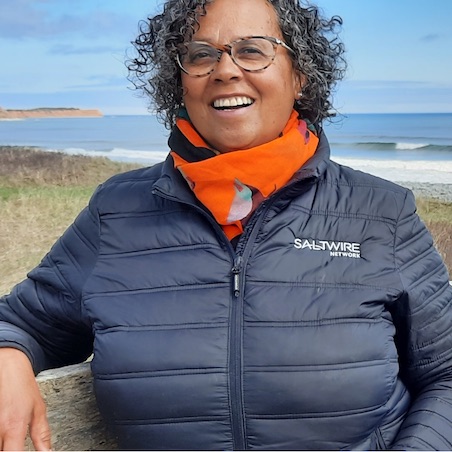Sheryl Grant
Journalist
Bachelor of Journalism (Honours), 1980
The thing that really attracted me to the digital side was data, the audience data. Being able to know what people were reading. That is the thing people sometimes don't want to know. You have to accept that you're writing for an audience one way or the other.
Sheryl Grant, BJ(Hons)’80, doesn’t always follow others’ advice—and that’s worked out well for her.
After completing a BA in English, Sheryl had a summer job working the front desk of the police station in Dartmouth; she took accident reports and checked in parolees. Before long “I just decided, I couldn’t do that job.” But Sheryl needed to work, and her next idea was to study journalism at King’s.
“My parents thought it was a really terrible idea,” she says. Sheryl was brought up in Halifax’s North End, the daughter of a mechanic and a schoolteacher. Her parents were regular consumers of newspapers and TV reporting and when she told them her plan, they responded “who do you see, who looks like you in journalism? This is not going to work.” But Sheryl knew she was a good writer. She persisted and with their eventual support, applied and was accepted. Two years later, Sheryl was proudly among the first cohort of King’s School of Journalism graduates.
After a short stint at a community paper, she was offered a job at the Chronicle Herald, one of Halifax’s two daily newspapers. It was ‘a different time,’ she remembers. “A lot of the people who worked there, they had parents who were lawyers and I felt “like a bit of a fish out of water.” As with all new reporters, she was moved to evenings and obituaries. Grant says nights were “A really good training ground. You had to be fast and get it done.”
“When I first arrived, my plan was to stay for two years. In the nineties, I decided I needed to do something different. I started to look for jobs in the US and then my mom got sick, and I really didn’t want it to be that far away. I just decided that local news was really what I wanted to do and I would find a way to make it work for me.”
In 2000, Sheryl was assistant managing editor, when she heard about a New Media Fellowship being offered by the Poynter Institute in Florida. The non-profit research institute chose her to spend a year studying digital journalism. When she returned to the Herald, she knew exactly where she wanted to be—in the basement with the web developers. “People didn’t really see why I was doing that,” she says. “I left the newsroom position and people really thought that I was crazy … Why would you want to work with the computer geeks?”
Sheryl became a ‘translator,’ working between the newsroom and the web developers to build a website, a web presence and help the two groups understand one another. “It’s a role I think is or should be obsolete at this point” but in that role she says she found a place she really belonged.
The significance of finding a place where she belonged was something she discovered at King’s. She says the university ‘cultivated’ it. A small and intimate place where you build strong relationships, she says, is powerful. It’s why she’s served on the Alumni Association Executive and the Board of Governors. “I don’t think that I would have my career without Kings,” she says, adding, “it’s a testament to their ability to take somebody like me from a completely different background and say, well, you know, we think you belong here too.”
After more than 40 years in the newspaper business, Sheryl is now retired. And while she’s planning to take more time for herself, largely to paint and garden, she’s already begun work on a film about her mother.
